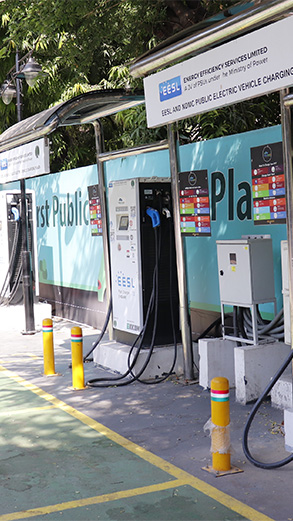Countries:
India
Status:
Completed
Sector:
Mobility
Developing a comprehensive electrification strategy for public transport (PT) and intermediate public transport (IPT) for two cities in India.
PT and IPT play a key role in providing transport options for people who do not own private vehicles, particularly low-income commuters. Switching to electric bus/IPT services not only offers an environmentally friendly solution with lower operating costs, but can also improve the quality of service and provide new employment opportunities.
The project aimed to create the enabling environment and a stakeholder ecosystem to support PT/IPT electrification in the cities of Ahmedabad and Mehsana. In particular, the project helped to increase awareness of the electric vehicle technologies among drivers and operators in the cities – while working with local policymakers to identify key policy barriers and drivers to accelerate the uptake of electric mobility.
UK PACT supported the two cities to develop a comprehensive electrification strategy and action plan to underpin the development of more sustainable, affordable, and inclusive urban transport systems. These also aimed to serve as a blueprint for public transport electrification in other cities in India.
The project was delivered by CEPT in partnership with Gujarat Energy Research Management Institute (GERMI), University of Leeds, and Brunel University.
“Now that we understand the linkages between EV and GESI issues, we might opt to target EV distribution to women drivers first. As women drivers preferred to take food orders, their operational range are limited to smaller area of commercial zone. This is in line with the performance of EV that is limited to closer range.”
Uun Ainurofiq
Director of Government Affairs & Strategic Collaborations, Grab India
“CEPT University organised a program on the electrification of electric three-wheelers (E3Ws). The workshop explained benefits of these vehicles in reducing pollution and also enabling extra savings for us. We found this workshop very useful.”
Dilip Joshi
Secretary, Ahmedabad School Vardhi Association
“To make the future more environmentally friendly, we need to shift these auto-rickshaw drivers from CNG to electric. To resolve the range anxiety and encourage more drivers to adopt electric autos, we are planning to set up charging stations. This will make it easier for drivers to charge their vehicles and keep operating them smoothly.”
M. Nagarajan (IAS)
Collector and District Magistrate, Mehsana

and action plan to develop an inclusive public transport service in Ahmedabad through bus and IPT electrification
on customer orientation focusing on sensitivity towards customers, enhanced sense of service orientation, and empathy towards passengers
for city officials to gain exposure to national and international city initiatives on sustainable mobility measures
attended by 200 IPT drivers to increase awareness about the cost, operations and processes involved in buying an electric vehicle
This project supported the cities in moving towards a sustainable, affordable and inclusive low carbon future through the development of a comprehensive electrification strategy for PT and IPT in Ahmedabad and Mehsana. Key results include:
held in both cities to understand the concerns of people from marginalised groups
targeting companies with female bus conductors on customer orientation and management
seen as a result of the projects efforts, with 61% of women surveyed on buses at the end of the project having shifted from other modes of transport
discussed with local banks to support women in purchasing an electric auto-rickshaw and support them in entering the electric auto-rickshaws industry
Throughout the delivery of the project, GESI activities were consistently embedded in all activities, enabling to build several lessons and enhanced project outcomes. Key GESI learnings and achievements include:

Building on the successful project implementation, stakeholders are expected to take forward the following next steps:
Significant barriers to the inclusion of more women in the e-3wheelers industry are still present, in particular when it comes to accessing finance to purchase vehicles. Concessional financing options for female drivers should be considered to incentivise uptake.
UK PACT (Partnering for Accelerated Climate Transitions) is a unique capacity-building programme. Jointly governed and funded by the UK Government’s Foreign, Commonwealth and Development Office (FCDO) and the Department for Energy Security and Net Zero (DESNZ) through the UK's International Climate Finance, it works in partnership with countries with high emissions reduction potential to support them to implement and increase their ambitions for tackling climate change.
© Copyright 2025 UK PACT Privacy Notice Cookie Policy